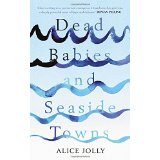I encountered Alice Jolly through the Book Connectors group on Facebook. Her inspirational book ‘Dead Babies and Seaside Towns’, published by Unbound on 2nd July 2015, is a true first hand account of her family, of losing a baby, Laura, and her attempts to complete the family unit through any means.
I’m not a maternal person and have never had any children of my own but from the first word to the last I was completely absorbed in Alice Jolly’s moving and honest account. The fact that it is a true story based on personal experience gives it all the more impact. I don’t think I have ever cried so much at a book, even when there are moments of lightheartedness too. As I read I kept trying to tear myself away and ‘Dead Babies and Seaside Towns’ kept calling me back. It was as if it had hit me in the solar plexus and had complete dominance over my feelings so that I had to keep reading.
What is so compelling is that readers could read ‘Dead Babies and Seaside Towns’ as a completely emotional fiction, but knowing it is based on Alice Jolly’s real experiences and those of the people she encounters makes it just stunning.
The rawness of the writing at times is harrowing and Alice Jolly pulls no punches about how difficult her and Stephen’s experience has been. However, what shines through most is that, by the end, they have Hope – in more ways than one!
Having been so moved by Alice Jolly’s writing, I was thrilled that she agreed to answer some of my questions.
Alice, ‘Dead Babies and Seaside Towns’ is such a personal book, how does it feel to have put it in the public domain?
If feels very good. It was a difficult book to write and an even more difficult book to publish (it was crowdfunded). I feel as though I can move on now although, paradoxically, the comments and questions of readers continually pull me back into the experiences and issues which the book raises. But I don’t mind that. I thought very hard before I started out on this whole process. You can’t do these things half-heartedly or lose your nerve. Once you are in, you are in.
There is a strong sense of place in this book. How important is place to you personally?
Enormously important. I write in the book about the fact that I am often over whelmed by the sheer ‘there-ness’ of things and that is really true. I also love books with a strong sense of place. That’s the joy of books. They make you see the ‘ordinary’ world around you differently and also take you to places you may never actually visit.
Have you always had sharp observational skills or did your experience of being still whilst pregnant with Laura heighten your observational powers?
I think that I have always noticed everything. I must have been born that way. But I think that it is also true that, when you have very difficult experiences, you cling to the physical details of the world. However bad you feel, you can often get out of your own head by soaking up everything that is around you.
I found your writing stunning – so emotional . You mention the writing process at times in ‘Dead Babies and Seaside Towns’. How much did you have to edit to convey your thoughts and feelings and how far was the book more of a natural progression simply writing about your experiences?
I do always do a great deal of editing and re-writing. I think nearly all good writers do. Having said that, there was a real sense in which I never really wrote this book at all. What I did was edit the diaries that I kept at the time. But still there was a huge amount of work involved. At some point you have to separate yourself from the work. You have to stop asking, ‘What do I want to say?’ and you have to ask, ‘What does the reader actually need to know?’ When that moment came for me, I took about 30,000 words out of the book in a week. That needed to happen.
Have you found writing ‘Dead Babies and Seaside Towns’ cathartic?
I didn’t write the book as therapy and I didn’t expect the process to make me feel better. But strangely it has. I say in one of the final chapters that books can be like boxes. There comes a moment when you put the lid on. Then you put it away on a shelf. You can get it out again if you want to but you can also leave it there for as long as you want. That’s what this feels like to me now. I’ve got the lid on. I will always have these issues on the shelves of my life but I make the decisions now about when I want to look at them.
You say at one point in the book ‘words are one of the few ways we can bring the dead back to life’. Do you often reread what you’ve written to remind yourself of Laura?
I’m certainly very glad that I’ve been able to honour my missing daughter by writing about her. I do like looking at the book for that reason. However, the book wasn’t just for her. It was for other parents who have been through similar experiences. But beyond that – importantly – it was written for everyone who suffers serious adversity, no matter what the cause. And actually that is all of us because life gets really tough for everyone at some point. Really the big question of the book is, ‘Why can’t we just talk openly about these difficult things?’ I don’t want everyone to wallow in misery all the time. But I really think that emotional authenticity is so important. When we are happy we should be able to say so, and when we feel desperate we should be able to say that as well.
How far, if at all, do you think attitudes have changed towards losing a child in pregnancy and towards surrogacy since your first hand experience?
The two issues are very different. Attitudes to stillbirths have changed a lot of the last 40 years. However, there is still a very long way to go. On the question of surrogacy, I think that opinions are changing all the time. However, there is sadly a huge amount of misinformation around the place. I never wanted to ‘market’ surrogacy. I just wanted to raise the level of the debate. I wanted to tell a ‘normal’ surrogacy story as the press only ever focus on extreme cases that have gone badly wrong. People should have proper information on which to base their opinions.
How did you go about finding just the right quotation to use at the beginning of each chapter?
Actually the quotes were horribly difficult. I just didn’t understand that the whole issue of Permissions (the process whereby a publisher asks permission to use quotes) is fraught with difficulty. Very late in the day it all went horribly wrong for me. I had used many quotes from R. S. Thomas who is my favourite poet but then the R.S.Thomas’ estate said that I couldn’t quote anything from his work. This came late in the publishing process and I was just exhausted. I got very teary about the whole thing and felt my book had been destroyed. But now I am happy with the quotes – despite having to choose mainly quotes that are out of copyright (so no permission is needed).
If you could provide one sentence of advice for those going through the same experience, what would it be?
I suppose I would quote Voltaire. ‘Life is a shipwreck but we must laugh in the lifeboats.’
If you’re not writing what do you like to read?
Modern novelists: Shirley Hazzard, James Salter, Anne Michaels. Classic novelists: the Brontes, Thomas Hardy, Scott Fitzgerald, Forster. Poets – Gerald Manley Hopkins and Philip Larkin. Also there is one small novel that everyone should read – The Return Of The Soldier by Rebecca West. It is perfect.
What are you currently writing?
I am writing a new novel. It is written in the voice of Victorian woman who is poor and self educated and yet tells her difficult story with extra-ordinary power. I already know that I will find it hard to get this novel published. That has always been a problem for me. But in all honesty I have no doubts about what I do. C.S.Lewis said, ‘We read to know that we are not alone.’ So many women who have read the memoir have said, ‘I feel as though you have told me my own story.’ Comments like that make it all worth it.
Find out more about Alice on her web site or follow her on Twitter
You can buy ‘Dead Babies and Seaside Towns’ direct from the publishers as well as here in the UK and here in America.
I’m sure Alice won’t mind if I include a couple of the links from the back of her book that might be helpful to others in her situation:


Excellent review of what sounds like an extremely emotional read. Fascinating Q&A too.
LikeLike
Thanks Joanne. The title put me off a bit initially but I was hooked from the first word. Alice Jolly is an incredible writer and her story amazing. I was afraid my questions might be too personal, but Alice was so generous with her answers.
LikeLiked by 1 person
Having read the book and found it very moving this was a great piece to hear more about the background to Alice’s writing. I admire Alice’s unflinching honesty and determination to air sensitive issues.
LikeLike
I couldn’t agree more. I found it so emotive. Thanks for dropping by to read the post
LikeLiked by 1 person